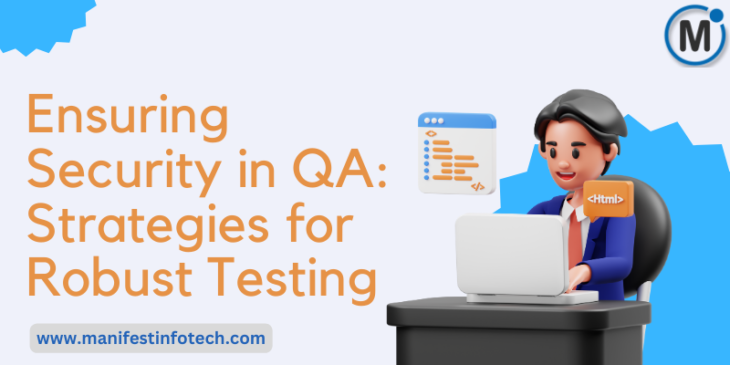
In this blog, we will explore key strategies for ensuring security in QA, with a focus on comprehensive testing methodologies.
𝟏. 𝐔𝐧𝐝𝐞𝐫𝐬𝐭𝐚𝐧𝐝𝐢𝐧𝐠 𝐭𝐡𝐞 𝐓𝐡𝐫𝐞𝐚𝐭 𝐋𝐚𝐧𝐝𝐬𝐜𝐚𝐩𝐞
The first step in ensuring security in QA is to have a thorough understanding of the current threat landscape. This involves staying updated on the latest cybersecurity threats and trends. QA teams should collaborate with cybersecurity experts to identify potential vulnerabilities and assess the risks associated with them. This knowledge forms the foundation for designing effective security testing protocols.
𝟐. 𝐈𝐧𝐜𝐨𝐫𝐩𝐨𝐫𝐚𝐭𝐢𝐧𝐠 𝐒𝐞𝐜𝐮𝐫𝐢𝐭𝐲 𝐓𝐞𝐬𝐭𝐢𝐧𝐠 𝐓𝐡𝐫𝐨𝐮𝐠𝐡𝐨𝐮𝐭 𝐭𝐡𝐞 𝐒𝐃𝐋𝐂
Traditionally, security testing was often considered a phase that occurred after the completion of development. However, to ensure robust security, it is crucial to integrate security testing throughout the Software Development Life Cycle (SDLC). By incorporating security measures from the early stages, QA teams can identify and address vulnerabilities before they become ingrained in the system, reducing the overall risk.
𝟑. 𝐏𝐞𝐫𝐟𝐨𝐫𝐦𝐢𝐧𝐠 𝐏𝐞𝐧𝐞𝐭𝐫𝐚𝐭𝐢𝐨𝐧 𝐓𝐞𝐬𝐭𝐢𝐧𝐠
Penetration testing, or ethical hacking, involves simulating real-world cyberattacks to identify weaknesses in a system. QA teams can employ skilled penetration testers to assess the security posture of applications. This proactive approach helps uncover vulnerabilities that may not be apparent through automated testing alone. Regular penetration testing should be conducted to stay ahead of emerging threats.
𝟒. 𝐀𝐮𝐭𝐨𝐦𝐚𝐭𝐢𝐨𝐧 𝐨𝐟 𝐒𝐞𝐜𝐮𝐫𝐢𝐭𝐲 𝐓𝐞𝐬𝐭𝐬
Automation is a key enabler in ensuring comprehensive and consistent security testing. Implementing automated security testing tools can efficiently perform tasks such as code analysis, vulnerability scanning, and compliance checks. Automated testing not only accelerates the testing process but also ensures that security checks are conducted consistently across different releases.
𝟓. 𝐀𝐏𝐈 𝐒𝐞𝐜𝐮𝐫𝐢𝐭𝐲 𝐓𝐞𝐬𝐭𝐢𝐧𝐠
In today’s interconnected digital ecosystem, APIs (Application Programming Interfaces) play a vital role in facilitating communication between software components. QA teams should focus on API security testing to ensure that data exchanges between different systems are secure and protected against potential breaches. This includes validating input data, authentication mechanisms, and encryption protocols.
𝟔. 𝐔𝐬𝐞𝐫 𝐀𝐮𝐭𝐡𝐞𝐧𝐭𝐢𝐜𝐚𝐭𝐢𝐨𝐧 𝐚𝐧𝐝 𝐀𝐮𝐭𝐡𝐨𝐫𝐢𝐳𝐚𝐭𝐢𝐨𝐧 𝐓𝐞𝐬𝐭𝐢𝐧𝐠
A significant portion of security breaches results from compromised user credentials. QA teams should rigorously test user authentication and authorization mechanisms to ensure that only authorized users can access sensitive data and functionalities. This includes testing password policies, multi-factor authentication, and session management.
𝟕. 𝐃𝐚𝐭𝐚 𝐒𝐞𝐜𝐮𝐫𝐢𝐭𝐲 𝐓𝐞𝐬𝐭𝐢𝐧𝐠
Protecting sensitive data is a critical aspect of application security. QA teams must conduct thorough data security testing to ensure that data is encrypted during transmission and storage. Additionally, it involves testing for vulnerabilities related to data input validation, SQL injection, and other common attack vectors.
𝟖. 𝐑𝐞𝐠𝐮𝐥𝐚𝐫 𝐒𝐞𝐜𝐮𝐫𝐢𝐭𝐲 𝐀𝐮𝐝𝐢𝐭𝐬 𝐚𝐧𝐝 𝐂𝐨𝐦𝐩𝐥𝐢𝐚𝐧𝐜𝐞 𝐂𝐡𝐞𝐜𝐤𝐬
Regular security audits and compliance checks are essential to ensure that applications adhere to industry standards and regulatory requirements. QA teams should collaborate with compliance experts to conduct thorough assessments and verify that the software aligns with relevant security standards, such as ISO 27001 or GDPR.
If you are looking for any services related to Website Development, App Development, Digital Marketing and SEO, just email us at nchouksey@manifestinfotech.com or Skype id: live:76bad32bff24d30d
𝐅𝐨𝐥𝐥𝐨𝐰 𝐔𝐬:
𝐋𝐢𝐧𝐤𝐞𝐝𝐢𝐧: linkedin.com/company/manifestinfotech
𝐅𝐚𝐜𝐞𝐛𝐨𝐨𝐤: facebook.com/manifestinfotech/
𝐈𝐧𝐬𝐭𝐚𝐠𝐫𝐚𝐦: instagram.com/manifestinfotech/
𝐓𝐰𝐢𝐭𝐭𝐞𝐫: twitter.com/Manifest_info
#SecurityInQA #QualityAssurance #SoftwareTesting #Cybersecurity #SecureSoftware #QAstrategies #RobustTesting #ApplicationSecurity #SDLCSecurity #PenetrationTesting #AutomationTesting #APISecurity #DataSecurity #AuthorizationTesting #ComplianceChecks #SecurityAudits #InfoSec #SecureDevelopment #QABestPractices #DigitalSecurity #ManifestInfotech #Blogs #Indore #India